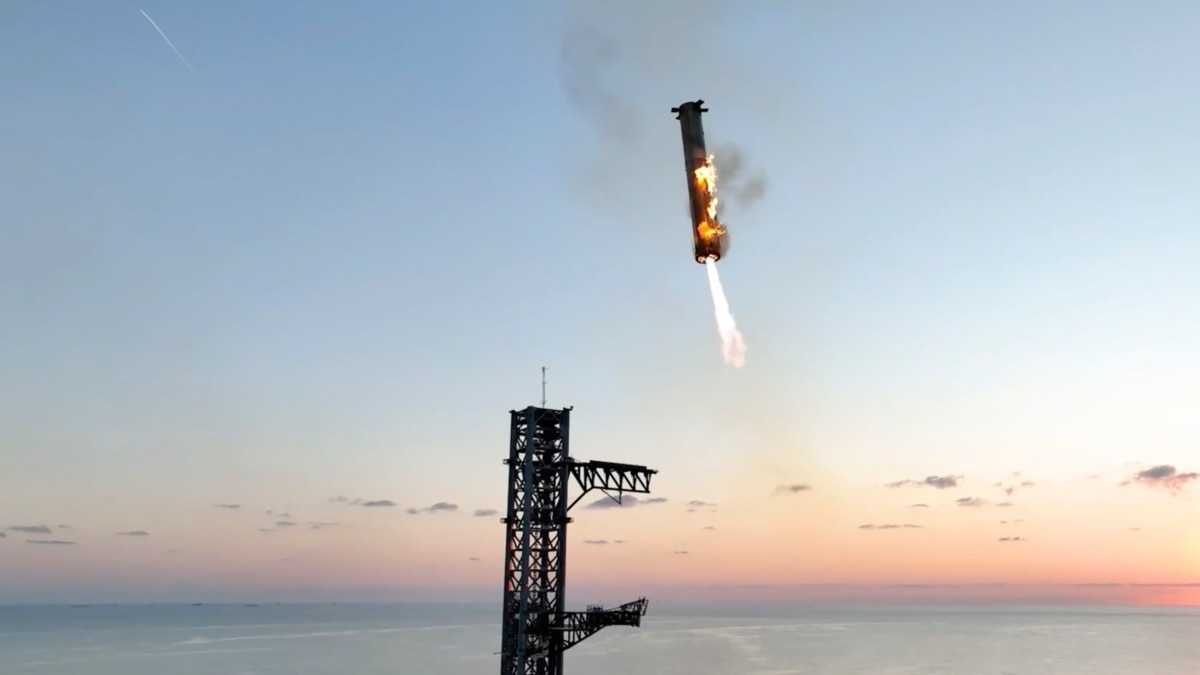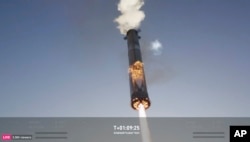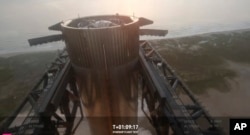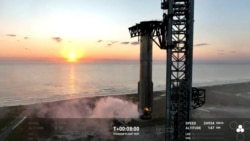Tech
SpaceX Calls New Starship Test a Success, Captures Rocket at Landing

SpaceX has successfully completed a fifth test of its Starship rocket system. The uncrewed test was carried out Sunday at the American space company’s launch center in Boca Chica, Texas.
During the flight, the 121-meter-tall Starship was successfully pushed into space by a SpaceX Super Heavy booster rocket. After reaching a height, or altitude, of about 70 kilometers, the booster separated from Starship’s second stage, or top half, as planned.
The reuseable booster was then directed by ground controllers to return to the launch center. Before touching down on the landing pad, the rocket re-lit three of its 33 Raptor engines in order to slow the booster for a controlled landing.
The Super Heavy then positioned itself to land. For the first time, the booster was “caught“ and secured in place by a huge structure that includes large metal arms. Video of the landing provided by SpaceX showed the booster rocket being captured by the structure exactly as planned.
A short time later, Starship’s second stage safely spashed down in the Indian Ocean. The test flight and successful landings demonstrated progress for SpaceX’s Starship system.
The American space agency NASA is planning to use Starship to carry the next U.S. astronauts to the moon. Such a landing would be the first since NASA’s Apollo 17 mission in 1972.
The next planned moon landing – which NASA officials have set for September 2026 – is part of NASA’s Artemis program. Artemis will also seek to establish a permanent base around the moon to support ongoing lunar visits and possible future trips to Mars.
SpaceX was chosen to lead NASA’s planned moon landing after numerous successful demonstrations and missions in recent years. The company’s rockets and spacecraft have been dependably transporting astronauts and materials to the International Space Station (ISS) since 2020.
NASA also chose American aerospace company Boeing to serve as a possible partner in its Artemis program. But the company’s Starliner rocket has faced major delays and difficulties during past test flights.
In the last one, Starliner successfully transported two American astronauts – Butch Wilmore and Suni Williams – to the ISS in early June. The two were expected to stay in space for only a week. But ongoing technical issues with the Starliner spacecraft prevented a return trip.
NASA recently decided to have Starliner return to Earth without the astronauts. The plan is for Wilmore and Williams to return home from the ISS in February on a SpaceX Dragon spacecraft.
Before SpaceX’s latest mission, several Starship rockets exploded during the test flights. The last non-exploding test happened in June. During that flight, SpaceX reported some damage to heat-resisting tiles on the outside of Starship. But improvements made since then appeared to have succeeded.
After Sunday’s flight, SpaceX chief Elon Musk said the rockets appeared to be generally in good condition, with just minor warping of some outer engine parts from intense heat. He noted that those parts could be fixed easily.
Musk is also chief of the social media service X. On the service, he expressed excitement when the Starship booster rocket returned to the launch area and was “caught” by the structure. SpaceX calls the huge metal arms that capture and secure the booster rocket on land “chopsticks” because they move similarly to the eating instruments.
“The tower has caught the rocket!!” Musk wrote in a message on X. “Big step towards making life multiplanetary was made today,” he added.
The successful test flight was also praised on X by NASA Administrator Bill Nelson. “Congratulations to @SpaceX on its successful booster catch and fifth Starship flight test today!” Nelson wrote. He added that “continued testing” will prepare NASA and its partners for a series of “bold missions” to come in the future.
I’m Bryan Lynn.
Bryan Lynn wrote this story for VOA Learning English, based on reports from The Associated Press, Reuters, AFP and SpaceX.
___________________________________________
Words in This Story
booster – n. an engine on a spacecraft that gives extra power for the first part of a flight
pad –n. a flat structure that is used by flying vehicles like rockets or helicopters to launch or to land
splash down –v. (phrasal) when a spacecraft lands in the sea after returning from space
tile – n. a flat piece of material that is used to cover surfaces such as floors, roofs or walls
warp – v. to become bent into the wrong shape
chopsticks – n. Think sticks used for eating food in many parts of the world
tower – n. a very tall building or part of a building
bold – adj. not frightened of taking risks











